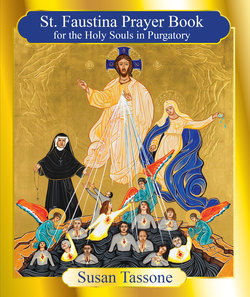Читать книгу St. Faustina Prayer Book for the Holy Souls in Purgatory - Susan Tassone - Страница 10
На сайте Литреса книга снята с продажи.
ОглавлениеIntroduction
A New Friend Named Faustina
“I have heard the Lord Jesus say that, on the Day of Judgment, He will be judging the world only in terms of mercy, because God is all Mercy. And by acting out of mercy, or neglecting mercy, a person determines their own judgment.”
— St. Faustina to Sister Damiana Ziolek
Are you ready to die today? Am I?
Are we fully prepared to stand before our all-pure, all-holy God?
Even if we’re in a state of grace, is it possible our snap judgment of others, selfishness, recurrent sins, pride, and long-held grudges have become such a part of our daily life that we’re blind to them? Is the habit of overlooking them, dismissing them, or explaining them away so deeply engrained in us that we quickly and easily point out the speck in our neighbor’s eye but fail to see the beam in our own?
Sometimes our love isn’t spotless. Our ingratitude, tepid faith, lack of forgiveness, and self-centeredness hobble our relationship with God right here, right now. And on the day we die, they can stand between us and heaven.
We don’t always get rid of these faults and shortcomings — these sins — during our time on earth. We may pass away with imperfections we didn’t conquer … or never tried to. And that’s why the God who is love has given us purgatory.
That’s why He offers us both the place to restore our souls and the means for that to happen.
The souls in purgatory are human beings that were weaved into the fabric of our daily lives: our families, friends, benefactors. These souls cry day and night from the depths of purgatory. They long and pine for God, their Beloved. Their tears are endless. Their suffering never ceases. They’re helpless.
Pope-emeritus Benedict XVI put it this way: “[Purgatory] strips off from one person what is unbearable and from another the inability to bear certain things, so that in each of them a pure heart is revealed, and we can see that we all belong together in one enormous symphony of being” (God and the World, p.130).
The Catholic Church’s teaching on purgatory is all about the abundance of God’s mercy, love, and grace. Purgatory heals our souls of sinfulness so that we can be united with God in heaven. More than that, even now, today, God invites us to play a role in this masterpiece of His mercy. While still on earth, we can help those who are in purgatory.
Just as Jesus asked St. Faustina to cooperate in His plan of redemption — to include in her spiritual life acts of charity toward the living and the dead — He asks that of you. And of me.
You may be familiar with St. Faustina and the Chaplet of Divine Mercy, but what you may not know is how mercy and the needs of the souls in purgatory were intertwined throughout her life.
On the day of her final religious vows, one of St. Faustina’s requests to Jesus was to free all those souls. It was that important to her, that central to her understanding of, and teaching of, God’s mercy.
The purpose of this book is to share with you how we can help ourselves avoid purgatory and, at the same time, come to the aid of the suffering souls there. To show you how we can speed them home to the heavenly Father. To point out that we’re on a mercy mission — with St. Faustina — to free them!
To help you become an “Apostle of Purgatory,” we’ll cover the seven major pillars God provides for us to relieve and release the suffering souls: doing the will of God in all things, the Mass, Scripture, the Rosary, Eucharistic Adoration, the Stations of the Cross, and the Chaplet of Divine Mercy.
Throughout this book, selected passages have been taken from the Diary of St. Faustina Kowalska. Those writings have had a powerful effect on me. I was overwhelmed by the love God has for us, and again reminded that we’re made in His image and likeness.
On a personal level, reading St. Faustina’s words has been like discovering a wonderful new friend, one who’s so approachable, warm, and caring. At the same time, her Diary reveals that she, too, had her share of suffering. Hers was not a charmed life … but a blessed one.
Since 1999, this is my ninth book on purgatory and the holy souls. I’ve given so many talks and interviews there are people who sometimes refer to me as “The Purgatory Lady.” But I’ll tell you something: St. Faustina has taught me even more about purgatory — and God’s love and mercy — and I’m so very grateful to her for that.
She’s ready to help you learn more, too. She’s inviting you to join her in praying for those holy souls.
May your heart be filled with love of the holy souls in purgatory. May they walk with you in a special way all the days of your life and, in time, welcome you into paradise.
You, and the souls of your dearly departed, are in my prayers.
— Susan
